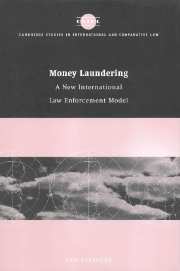Book contents
- Frontmatter
- Contents
- Preface
- Table of treaties and agreements
- List of abbreviations
- Part I New instruments in the fight against acquisitive crime: confiscation of proceeds from crime and criminalisation of money laundering
- Part II The prevention of money laundering
- Part III Jurisdiction over money laundering
- Part IV International co-operation in combating money laundering
- 11 The money laundering regime: new objectives of international co-operation in criminal matters
- 12 The money laundering regime: new modes of international evidence-gathering
- 13 Some of the conditions, principles and exceptions of mutual judicial assistance in criminal matters revisited
- 14 Lifting banking secrecy in an international context
- 15 Provisional measures for preserving alleged proceeds of crime in an international context
- 16 International enforcement of confiscation orders
- Epilogue
- Bibliography
- Index
- CAMBRIDGE STUDIES IN INTERNATIONAL AND COMPARATIVE LAW
12 - The money laundering regime: new modes of international evidence-gathering
Published online by Cambridge University Press: 16 October 2009
- Frontmatter
- Contents
- Preface
- Table of treaties and agreements
- List of abbreviations
- Part I New instruments in the fight against acquisitive crime: confiscation of proceeds from crime and criminalisation of money laundering
- Part II The prevention of money laundering
- Part III Jurisdiction over money laundering
- Part IV International co-operation in combating money laundering
- 11 The money laundering regime: new objectives of international co-operation in criminal matters
- 12 The money laundering regime: new modes of international evidence-gathering
- 13 Some of the conditions, principles and exceptions of mutual judicial assistance in criminal matters revisited
- 14 Lifting banking secrecy in an international context
- 15 Provisional measures for preserving alleged proceeds of crime in an international context
- 16 International enforcement of confiscation orders
- Epilogue
- Bibliography
- Index
- CAMBRIDGE STUDIES IN INTERNATIONAL AND COMPARATIVE LAW
Summary
International, treaty-based co-operation between judicial authorities was traditionally portrayed as the sole mode of gathering evidence abroad. It will be shown, however, that in the context of the international fight against money laundering (and also outside this particular context), new modes of international evidence-gathering have become increasingly important. On the one hand, administrative and police co-operation are expanding and have partly taken over the functions of judicial mutual assistance. In this respect, the exchange of information between FIUs has obtained a very important role and the conditions under which this type of mutual administrative assistance takes places, merit to be scrutinised. Apart from this evolution, some national authorities have had recourse to unilateral extraterritorial measures instead of using the channels of international judicial co-operation. These new developments in the field of international evidence-gathering make it necessary to investigate the exact position of treaty-based co-operation in criminal matters.
Exchange of information relating to suspicious financial transactions: judicial, administrative or police assistance?
The important role that is played by the FIUs in the combat against money laundering, has already been expounded in Part 2. In order to fulfil their role, these FIUs mutually exchange information. The international co-operation between FIUs takes place almost completely outside the framework of traditional judicial co-operation in criminal matters. By mutually exchanging information, FIUs are often able to clarify the background of suspicious transactions and thus succeed in fitting the pieces of the pro- verbial jigsaw puzzle together. This exchange of information can take different forms: on request, spontaneously (i.e., on the initiative of the financial intelligence unit that provides information) or periodically.
- Type
- Chapter
- Information
- Money LaunderingA New International Law Enforcement Model, pp. 258 - 286Publisher: Cambridge University PressPrint publication year: 2000

